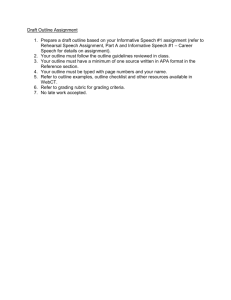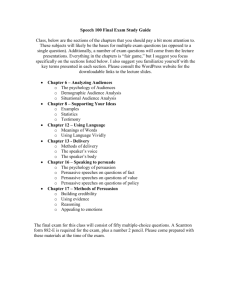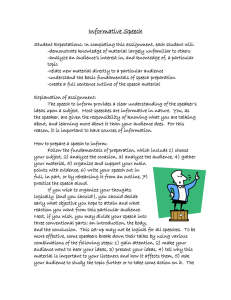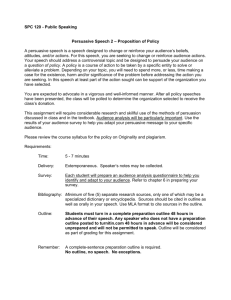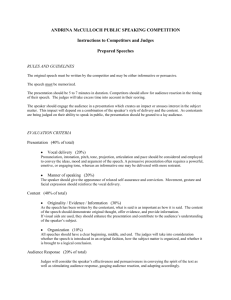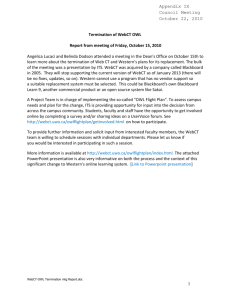Oral Presentations 661:150:05, Spring 2010
advertisement
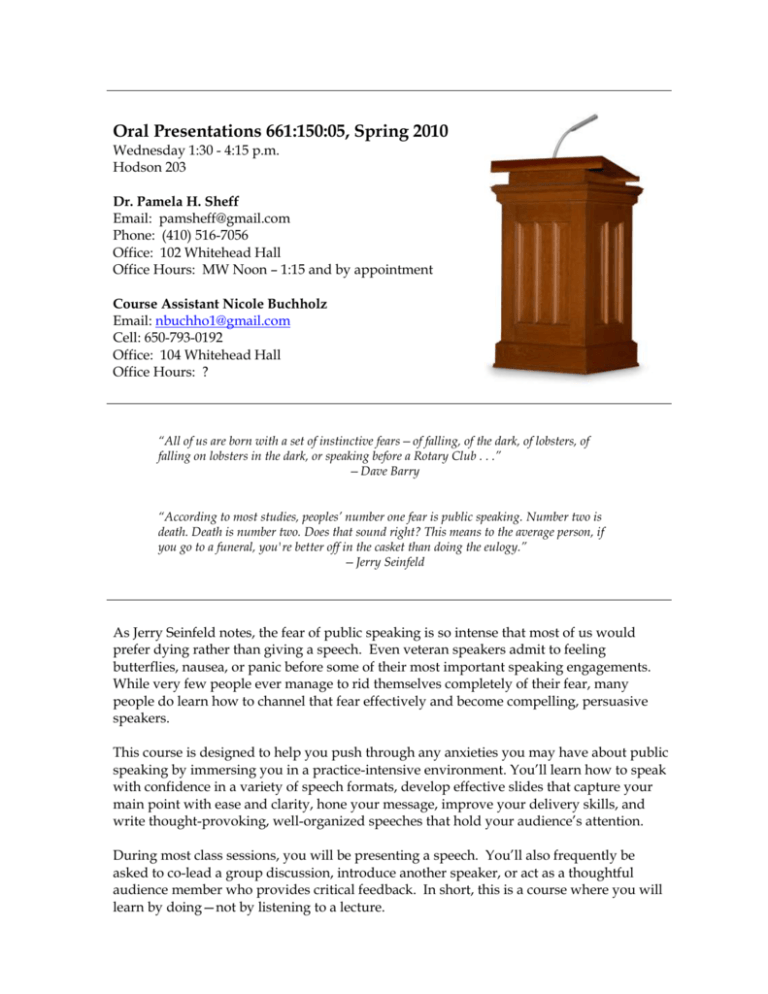
Oral Presentations 661:150:05, Spring 2010 Wednesday 1:30 - 4:15 p.m. Hodson 203 Dr. Pamela H. Sheff Email: pamsheff@gmail.com Phone: (410) 516-7056 Office: 102 Whitehead Hall Office Hours: MW Noon – 1:15 and by appointment Course Assistant Nicole Buchholz Email: nbuchho1@gmail.com Cell: 650-793-0192 Office: 104 Whitehead Hall Office Hours: ? “All of us are born with a set of instinctive fears—of falling, of the dark, of lobsters, of falling on lobsters in the dark, or speaking before a Rotary Club . . .” —Dave Barry “According to most studies, peoples’ number one fear is public speaking. Number two is death. Death is number two. Does that sound right? This means to the average person, if you go to a funeral, you're better off in the casket than doing the eulogy.” —Jerry Seinfeld As Jerry Seinfeld notes, the fear of public speaking is so intense that most of us would prefer dying rather than giving a speech. Even veteran speakers admit to feeling butterflies, nausea, or panic before some of their most important speaking engagements. While very few people ever manage to rid themselves completely of their fear, many people do learn how to channel that fear effectively and become compelling, persuasive speakers. This course is designed to help you push through any anxieties you may have about public speaking by immersing you in a practice-intensive environment. You’ll learn how to speak with confidence in a variety of speech formats, develop effective slides that capture your main point with ease and clarity, hone your message, improve your delivery skills, and write thought-provoking, well-organized speeches that hold your audience’s attention. During most class sessions, you will be presenting a speech. You’ll also frequently be asked to co-lead a group discussion, introduce another speaker, or act as a thoughtful audience member who provides critical feedback. In short, this is a course where you will learn by doing—not by listening to a lecture. Required Texts and Materials A Speaker’s Guidebook O’Hair, Stewart, and Rubenstein ISBN: 0-312-44318-8 The Shortcut to Persuasive Presentations Larry Tracy ISBN: 1-59109-702-9 Presentation Zen Garr Reynolds ISBN: 10: 0321525655 and 13:978-0321525659 Speech Assignments and Grade Percentages See course schedule for actual deadlines and due dates. BASELINE SPEECH (NG) For this assignment, you will be asked to prepare a two to three minute speech on a topic of your choice—without using slides or other presentation aids. You may choose to reuse an old speech or write an entirely new speech. The purpose of this assignment is to establish a performance baseline from which I will measure your progress throughout the semester. This speech will not be graded. CO-LEAD A DISCUSSION (5%) For this assignment, you will be paired with a partner and asked to co-lead a class discussion on a selected article for 15 minutes. Both partners will receive the same grade, and part of the grade will reflect how well the partners work together in getting the class to understand the main point of the article. The articles will be posted on the WebCT site, and everyone in the class will be asked to read and prepare each team’s selected article. These discussions will happen over a period of eight weeks. EXTEMPORANEOUS SPEECH (10%) For this assignment, you will select a topic from a short list and be given 20 minutes to prepare a two-minute, extemporaneous speech. INFORMATIVE (REVISED) SPEECH (10%) For this assignment, you will prepare a two- to three-minute informative speech that you will first deliver in front of what Larry Tracy calls a “murder board.” The following week, you will deliver a revised, four- to five-minute version of the speech based on the feedback you received during the previous session. You will 2 be asked to prepare five to seven PowerPoint slides to use during this speech, but your slides will not be graded. POWERPOINT SLIDES (10%) For this assignment, you will prepare a set of PowerPoint slides for use during your technical presentation speech. Follow the principles in Presentation Zen in creating your slides. We will conduct a whole-class review session of your slides, and you will use this feedback to revise your slides for the final technical presentation. The slides will be graded separately from the oral presentation. TECHNICAL PRESENTATION SPEECH (10%) For this assignment, you will prepare a seven- to eight-minute speech on a technical topic based on your field of study or expertise. You will turn in this speech in manuscript form, BUT you may not read it. You must prepare both a written version and an oral version. Both versions must contain relevant visuals/graphics that communicate important data relationships, and be accessible to a well-educated audience who may or may not have a technical background. This presentation must include a “Zen-like” set of PowerPoint slides that you have revised according to the group feedback you received during the previous assignment. The speech and the slides will be graded separately; however, part of your speech grade will incorporate how well you use and manipulate the slides throughout your presentation. THE INTERVIEW (10%) For this assignment, you will be asked to submit a cover letter and resume for one of several job listings I will distribute on the WebCT site. Then, you will be asked to “interview” for the job in front of a panel of interviewers during our regularlyscheduled class period. The class will participate both as panel and “silent audience” members and give you feedback on your interviewing skills. PROBLEM-SOLVING, PERSUASIVE SPEECH (10%) For this assignment, you will present a three- to four-minute speech in which you will try to persuade the audience to accept a proposed course of action. Your speech will be written in response to one of three pre-distributed scenarios that are JHU-specific. Since everyone will be writing from the same scenarios, your job will be to persuade me that your solution is better than your peers’. You may use slides or other presentation aids if you wish. THE PLAN B SPEECH (10%) For this assignment, you will be asked to recycle your four- to six-minute informative speech from the beginning of the semester and prepare for the worst case situation to happen. At the beginning of your speech, you will draw a random scenario out of a bag and be given one minute to prepare your “Plan B” speech. The worst case 3 situations might include—but are not limited to—major problems with lighting, no sound, no PowerPoint availability, a hostile audience, lost notes, or a radically reduced period of time to deliver the speech. SELF-EVALUATION EXERCISES (15%) FINAL EXAM (5%) Each time you deliver a speech in class, you will be videotaped using the Lecture Record System in Hodson 203. Each week, this video footage will be posted to an account on J-Share, and you will be asked to review it on your own time. The primary purpose of viewing yourself will be to notice any habitual patterns you may have, to highlight areas where you need to improve, and to conduct selfobservation exercises that will help you learn more about yourself from an objective point of view. All of these exercises are geared toward helping you become a better public speaker by helping you bring awareness to certain tics, traits, mannerisms, or blindsights about yourself that you may not know that you have. You may occasionally be asked to review other peoples’ video footage and respond to that as well. After you have viewed the footage and/or conducted any supplemental exercises, you will write a one-page reflective document discussing what you learned and email it to me no later than midnight each Sunday. These are not formal papers, so they can be more casual than a term paper or essay. However, they are meant to be thoughtful, reflective exercises and will be graded according to the depth of their insight and the seriousness with which they are pursued. I will read and make some comments on them each week. I will ask you to save your selfevaluations and turn them back to me with your final exam. I will grade them holistically at the end of the semester. For the final exam, I will ask you to do a final, more lengthy SE exercise and email it to me by noon on Monday, May 10th. ATTITUDE AND PARTICIPATION (5%) This will be a dynamic, highly interactive course where you will be expected to be an active audience member who gives helpful, thoughtful feedback to your peers to aid them in improving their work. Thus, you should consider any peer review, Q & A, audience feedback, or group work session as a graded “speech” that counts toward your overall grade. I will grade this component holistically at the end of the semester. Thus, you want to make sure you are an active participant throughout all thirteen weeks. Tentative Course Schedule* *This is a rough plan for the semester that will change based on the progress of the class. Please use the course calendar posted on the WebCT site as the definitive schedule for the course. Any changes announced in class will be sent out via email and posted to the course calendar within 24 hours. 4 Any reading or preparatory assignments are due on the day listed. W 1/27 Course Introduction, Syllabus, Intro Speeches, Public Speaking: 1 to 1000 (film) Begin reading Larry Tracy’s Shortcut to Persuasive Presentations S 1/31 SE #1 Due W 2/3 Developing Speech Criteria, Baseline Speeches Skim green tabs #14-19 in Speaker’s Guide Watch Standard Deviants (30 mins.) on WebCT Keep reading Tracy’s Persuasive Presentations Prepare a 2-3 minute speech on your choice of topic. S 2/7 SE #2 Due W 2/10 Extemporaneous Speeches, Article Selection, Tracy’s Persuasive Presentations Read pages 257-259 on extemporaneous speaking in Speaker’s Guide Look over articles listed on WebCT and list your top three choices Skim red/green tabs #6-13 on organizing and delivering speeches in Speaker’s Guide Finish reading Tracy’s Persuasive Presentations S 2/14 SE #3 Due W 2/17 Team #1 Article Discussion, Informative Speech w/Murder Boards Re-read Tracy section on “murder boards” Read blue tabs #28-30 on business/classroom speaking in Speaker’s Guide Read pages 474-476 on Q & A in Speaker’s Guide Read the sample informative speech on pages 457-462 in Speaker’s Guide Read team #1 article on WebCT Post copy of informative speech to WebCT by midnight S 2/21 W 2/24 SE #4 Due Team #2 Article Discussion, Revised Informative Speech Read team #2 article on WebCT Revise your speech according to the feedback you received during the murder boards. Submit a copy of your resume and cover letter to apply for one of the jobs for next week’s interview process. S 2/28 SE #5 Due W 3/3 Team #3 Article Discussion, Tips on Using PowerPoint, Interviews Read team #3 article on WebCT Read green tabs #20-22 on presentation aids in Speaker’s Guide S 3/7 SE #6 Due W 3/10 Team #4 Article Discussion, Tips on Doing Technical Presentations, Interviews 5 Read team #4 article on WebCT W 3/17 SPRING BREAK S 3/21 SE #7 Due, Draft of Technical Speech Manuscript + Slides Due W 3/24 Team #5 Article Discussion, Technical Slides Group Peer Review Read team #5 article on WebCT S 3/28 SE #8 Due W 3/31 Team #6 Article Discussion, Technical Presentations w/Revised Slides Read team #6 article S 4/4 SE #9 W 4/7 Team #7 Article Discussion, Technical Presentations w/Revised Slides Read team #7 article S 4/11 SE #10 Due W 4/14 Team #8 Article Discussion, Problem-Solving Persuasive Speech Read team #8 article Read sample persuasive speech on pages 462-464 in Speaker’s Guide Review Tracy’s Persuasive Presentations S 4/18 SE #11 Due W 4/21 Plan B Scenario Speeches Re-prepare your revised informative speech and get ready for the worst! S 4/25 SE #12 Due W 4/28 Make-up, Revise, or Re-do Speech You can choose to make up a missed speech, give a revised version of a poorly written speech, or re-do a poorly executed speech. You are also welcome to take a risk and try out something entirely new—just for fun. Monday 5/10 Final SE-Exam Questions Due by Noon. Course Policies and Expectations Electronic Equipment We will be holding class in Hodson 203—one of the smart classrooms with a sensitive AV system. Because of this, it is imperative that you turn off completely all cell phones, beepers, pagers, or BlueTooth-enabled devices to prevent the speakers from buzzing on incoming calls. (Quiet and vibrate modes equally affect the system.) 6 Attendance and Tardiness Because most of our graded work will happen during the actual class period, it is imperative that you come to every class period well prepared and on time. Chronic tardiness and absenteeism will jeopardize your ability to pass this class. If you know you will have to miss more than one class, I would recommend taking this course during a different semester. If you miss more than two classes, you will not be able to pass this course. Missed Speeches If you miss a speech due to an absence, you will be allowed to make it up on the last day of class. However, you may only make up one (1) missed speech. Therefore, it is imperative that you attend each and every class session. Late Work All Self-Evaluation Exercises (SEs) are at be emailed to me by midnight each Sunday. I will accept late SEs up until class-time on Wednesday. However, if you are late on more than one or two SEs, your overall SE grade (15% of the course grade) will drop by one halfgrade for each late SE. I will not accept SEs after the next Wednesday’s class. Participation Part of your grade in this course will depend upon your active performance as a helpful audience member for the other speakers. Every time you engage in a Q & A session, murder board, peer review, or feedback session, you should think of it as an informal public speaking opportunity. If you work on material from other classes, refuse to ask questions, carry on distracting sidebar conversations, heckle the speaker, talk on your cell phone, remain silent throughout the class, or use text messaging, your participation grade will be zeroed out. Special Needs and Learning Disabilities If you need an accommodation due to a documented disability, please come visit me during office hours the first week of class or at your earliest convenience. I am fully committed to helping you succeed in this class. If you have no documentation, please register first with the Director for Disability Services. More information can be found here: http://jhuaa.org/DSS/index.html Academic Integrity and Plagiarism The strength of the university depends on academic and personal integrity. In this course, you must be honest and truthful. Ethical violations include cheating on exams, plagiarizing material, reusing other people’s assignments, using the internet and electronic devices in an improper way, collaborating in an unauthorized or deceitful way, altering graded assignments, forging or falsifying sources, lying to the instructor, facilitating academic dishonesty, and competing unfairly against your colleagues. I have a zero tolerance policy toward plagiarism and ethical violations. If you are caught plagiarizing or cheating, you will immediately receive an automatic “F” as your final grade in the course. The incident will also be reported to the Ethics Board, and you may be expelled from the university. For further clarification on the definitions of plagiarism and 7 cheating, I would direct your attention to the Ethics Board website: http://ethics.jhu.edu. Please report any violations you witness to the instructor. You may also wish to consult the associate dean of student affairs and/or the chair of the Ethics Board beforehand. Personal Email Email is a great way to contact me, and I am happy to answer any course-related questions you might have. My email address is pamsheff@gmail.com. I can usually respond to most emails within 24-48 hours. Please follow the standards of normal English and capitalize/spell out all appropriate words—i.e. do not use text messaging abbreviations or slang—and use appropriate salutations/closings to identify yourself. WebCT Site We will be using a WebCT site for this course. Go to http://webct.jhu.edu, login to myWebCT, type your JHED User ID and password, then select your course from the myWebCT page. The registrar will automatically assign you to the course. If you have any problems logging in to the course, wait 24 hours and try again. If you are still having problems, you can visit: http://webct.jhu.edu/support4/student or send an email to webct@jhu.edu. Electronic Archive Please maintain an electronic archive and a backup of all your SE exercises, speeches, and slides. I recommend backing your work up with a USB stick, writeable CD-ROM, Google mail, or other web account in the event that your hard drive suffers some kind of catastrophic failure. 8

